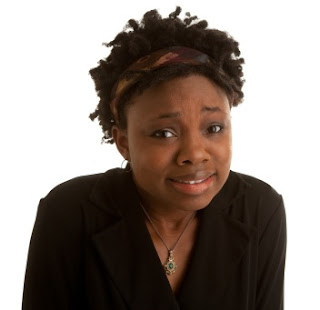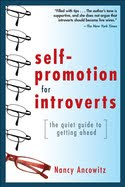
By Laura Salas, Shrinking Violets Field Reporter
LAURA: I'm a real over-preparer when it comes to public speaking. How do you know when to stop?
NANCY: Preparation is generally a good thing, especially for introverts. It's just in the boo-hiss camp when we go over the line by wearing ourselves down with self-doubt and by focusing on minutia that don't matter to our audiences.
Recognize the downsides of over-preparing. Does it increase your anxiety around presenting? Does it mean you won’t get enough sleep? Are you neglecting another important project or a relationship because you’re so immersed in the preparation process?
Also, I've noticed that most of my public speaking clients spend most of their preparation time on content rather than delivery. However, they're already content experts. So what they really need to do more is practice how they'll speak in a strong, modulated voice, gesture effectively, and use the space.
LAURA: This part blew me away. And it’s true. I focus on that content, over and over again. When the truth is, it’s my gestures and my voice and my facial expressions that need more work. This was a revelation for me!
NANCY : Reflect on these questions:
a. How much time did you spend preparing for your last presentation and what was the outcome?
b. Had you spent less time preparing, how would that have affected your presentation?
c. What are the top five activities you typically engage in to prepare for a talk (e.g., researching, writing down your main points, fleshing out your speaker’s notes, creating visuals, rehearsing)?
d. How much time do you spend on each activity?
e. What are the time drains that produce minimal gain?
f. How could you prioritize and/or delegate your activities differently to use your energy more efficiently next time?
g. What matters most to your audience members? Prioritize what you think is most and least important to them. If you’re not sure, ask for feedback from your audience when it's appropriate.
h. How can you get support to help you rein in your tendency to over-prepare? Do you have a friend, mentor, or coach to help hold you accountable to preparing smarter, not harder?
So, I’ll tip your seat if you tip mine and we’ll both get out from under the stagnant canopy of rethinking, re-editing, and reconsidering that hovers over us when we get into over-preparation mode. Let's arrive more present for our audiences, refreshed, and light on our feet for our next presentation -- by knowing when enough preparation is enough.
: : : :
LAURA: Do you have any presentation tips specifically for school visits? I like your Framework points on pages 152-153. For school visits, though, an additional goal, on top of informing and inspiring and increasing visibility, is to entertain! If children's authors don't entertain on our school visits, we usually don't book more visits. But "performing" is so daunting to me. So, any thoughts on how an introvert can psych herself up to be entertaining?
NANCY: Adult and children audiences alike enjoy being entertained. If you focus on how you hate the spotlight and how you're not "ha-ha" funny, you might as well stay home. If instead you embrace your audience and look to brighten their day by sharing your creations with them, you'll take the focus off yourself.
Borrowing a quote from my book, from Lewis Bernstein, Ph.D., executive vice president of education and research at the Sesame Workshop, the nonprofit behind Sesame Street: "We are each an entire universe with unique value and something special to offer. So like my good friend Grover on Sesame Street who is naturally shy, we must all find ways to let our passion and potential bubble out of us so we can share them. Sometimes that takes practice, discipline, and trial and error. It is almost always worth it."
LAURA: I love this. I always thought it was better to be yourself than to put on a completely false act. At the same time, I’m realizing I can make my school visit mood more fun in 2 simple ways: 1) introduce even more interactive poetry reading techniques with the kids and 2) smile more. I’m generally a smiley person, but pictures of me doing school visits indicate that I don’t smile much during them! I’m going to work on that during my practice sessions.
: : : :
LAURA: Sometimes I naturally use my hands in my presentations, and that's great. But other times, when I'm very nervous, I just don't know what to do with my hands! Everything feels false. Is there one standard pose that I can remember as my "default pose?" So that when the hand gestures aren't coming naturally, I can fall back on that?
NANCY: The funny thing about hands is that most people don’t what to do with them in front of an audience without a little training. It feels weird to do what looks natural when you’re onstage. That's why it helps to practice in a mirror, or better yet, on videotape. There's nothing like seeing what works best on you. Try a bunch of different things and pick a few gestures that look good. Once you've practiced gesturing, your hands will know what to do no matter how nervous you feel.
As a guideline, my favorite neutral position for a presenter’s hands is relaxed at her side. And when she’s telling a story or making a point, I like to see her hands and arms open and out, gesturing naturally. If you’re someone who gestures a lot in conversation, then use your hands plenty. If you don’t gesture much, then no need to do so in front of an audience.
LAURA: Oh, good! I always felt a little wrong or uncaring, somehow, when I would just stand with my hands at my sides. I don’t think I’ll feel so awkward now that I have official permission. Thanks!
: : : :
LAURA: When kids get roped into listening to me read my book, but they're clearly not the right audience age for the book, what should I do? My book Stampede is poems about kids at school and how they behave like animals. But at readings, I often find myself reading to toddlers or preschoolers who are too young for the poems (and the humor is over their heads).
NANCY: Since I’m a business book author, I can’t say that I’ve shared your experience on this—or on school visits that you mentioned earlier. However, here are my initial thoughts.
When your audience isn’t properly matched to the material you’d normally read, I wonder if it would be best to have a couple of fun animal exercises up your sleeve so that the toddlers and preschoolers can experience the book without reading it. This way their parents can buy your book for their older siblings.
LAURA: That’s a great idea. I usually add kid-generated sound effects after each poem, but maybe if it’s JUST preschoolers, I can have a set little activity in mind where we go through the book, identify the animals if possible and try out the animal noises. And that gives me an idea for if I’m stuck with upper elementary kids who think they’re too old for the book, too. I’m going to turn it into some kind of riddle game. Thanks! This will put me at ease some.
: : : :

LAURA: I have the world's worst memory! I know a lot of people from online or from occasional in-person meets, but I don't remember them. So I'll be at a writer's conference and people will come up to me and chat and I have no idea who they are. It's not a matter of just not knowing their name. I don't know who they are! Sometimes it's even people who have taken online classes from me and they're wearing nametags. I just don't have any idea where I know them from. I feel like they'll be insulted that I don't recognize their name or face if I've met them before. It's people that I've had more than just one casual email with or something. Any advice?
And just so you don't think I'm exaggerating, I recently asked a family member by marriage how his mom was doing. His mom died years ago, and I knew that. But when I'm chatting with people, my mind just goes blank!
NANCY: I can relate! How would you feel if we turned the tables and you greeted someone who had no clue who you were? Would you be offended if the person was polite but didn't register a glint of recognition? How about if he said something like this: “You look familiar, but amid all this hustle and bustle, I’m having trouble placing you at the moment.”
I would be understanding. How about you? When you can’t remember someone, how you react nonverbally is at least as important as what you say. Do you look guilty? Ashamed? Or more relaxed and curious?
When the acquaintance amnesia happens at book signings, you can just say, “Who would you like me to sign this book for?” If you’re unfortunate enough to get a “just write my name” type response, I suppose you can still ask how you spell it and hope it’s not something like Mary!
LAURA: I would be understanding if the tables were turned, but my bad memory really makes it hard to network comfortably. I’ve had writer friends (on a fairly regular basis) express surprise that I didn’t recognize somebody we’d all met several times before or heard speak earlier at a conference or something like that. I just feel so rude. But I’m sure you’re right about the nonverbal reaction. I get so stressed about it that that must transmit itself to the other person, too. I guess I need to accept that this is not my strong suit and try not to let it freak me out so much.
: : : :
If you’re lucky enough to live in or near NYC, you can check out Nancy’s upcoming events and classeson her website. She does do most of her presentation coaching in person, but says, “…I have done a little coaching via Skype and we can use other interactive real-time software as well. If myself and a client are meant to work together, we don't allow distance and technology to be barriers.” She’s coached authors and artists as well as many clients in the corporate world.
I’d love to hear Nancy speak in person someday—though I likely wouldn’t recognize her:>) Still, maybe I’d have my elevator speech ready by then and could try it out on her. Meanwhile, I’m grateful for all the information and encouragement in self-promotion for introverts.
Now, I’m off to read through my highlighted passages again. I have all sorts of notes written down, and I have a feeling I’ll find a few things to add to my 2010 Writing Goals List. And all year, I plan to tune in to U-ROCK Radio and tell myself, “I am writing what I am meant to write,” and “I take risks to stretch my creativity and improve my writing.” Maybe by the end of the year, I’ll completely believe both of those!
: : : :
ABOUT NANCY: Nancy Ancowitz is a business communication coach, an adjunct instructor at NYU, and the author of Self-Promotion for Introverts (McGraw-Hill), which was selected for "Best Books for 2009" by Publisher's Weekly. You can visit her Self-Promotion for Introverts blog at http://www.selfpromotionforintroverts.com; Nancy also blogs for Psychology Today.





10 comments:
I'm in the midst of a blog tour and a couple of public appearances for my new book, and I'm totally overwhelmed by Promotion 2.0. I've bought Nancy's book but haven't had time to read it! I'd love to go back under my rock but can't. So enter me please, I need help.
The bit about what to do with one's hands during a talk is very helpful! I'm pretty sure I do all the WRONG things--wring them, clench them, or let them fly around uncontrollably. :P I clearly need to practice some non-stress-related hand gestures...
My whole life I've been good at remembering names. But lately? Not so much! And it DOES stress me out and I'm SURE my body language shows it. This helps remind me to just let that go... forgive myself, essentially, so I can "perform" without so much anxiety. Always something new to work on -- thanks, Violets!
Such helpful advice for focusing on the most important aspects of public speaking. Thank you!
This is a fabulous interview, Laura, with extraordinarily helpful content.Thank you so much!
Awesome interview!
I can totally relate to the blanking out phenomenon. Once after a speaking engagement, someone asked me what my youngest child's middle name was. For the life of me I couldn't think of it! This is too common with me and my introvert friends. Sometimes I just fess up that I do this when I'm out of my element, and isn't it funny? I try to keep a sense of humor about it and find that others are quite forgiving. I've explained this at book signings, and have found that people really do understand and will remind me of their names before I even ask. I think it makes me more approachable. That's what I tell myself anyway! :)
This was by far one of the best interviews I have read in a long time. The information was very helpful and easy to implement. Thanks
hello!
happy valentine 2010
My thoughts on a few of the comments:
Laura, it's only human to be overwhelmed by the whole Promotion 2.0 business, blog tour and all.
Consider the following:
1. A blog tour sounds big and scary, but one blog interview at a time can be doable. I hope you can have as much fun with each blog interview as I've had with my interviews with Laura.
2. So find some aspect of your blog tour that you enjoy and remind yourself of that each day. It might be reaching lots of cool new people with your work. It might be conquering a fear. Or you might find something fun about periodically perching atop your rock to catch a few rays.
3. Remember that you're the world's expert in your creations. People are excited about your books and want to hear what you have to say. That brings to mind Adam Gopnik's article in this week's "New Yorker": "J.D. Salinger's long silence, and his withdrawal from the world, attracted more than the usual degree of gossip and resentment—as though we readers were somehow owed more than his words, were somehow owed his personal, talk-show presence too…." Find the amount of time and energy that's right for you to spend speaking to your audience.
4. If you're an introvert, it's important to be aware of the amount of downtime you need to refresh yourself between interactions. I find this is true for not only in-person interactions, but also conversations like blog and podcast interviews. Honor your need to chill before you speak.
5. The more you can show up authentically and generously for your audiences, the more you can relax and just be present with them.
A. Fortis, Watch what other speakers do with their hands. Notice what supports their message and what distracts you. Then consider what you can incorporate into your own hand gestures. Focusing on some concrete aspects you'd like to change around your hand gestures will likely make the task much easier.
Irene, I like what you said about forgiving yourself for not remembering names. Your body language and words can flow from that forgiveness.
Rebecca, You're so right about remembering to have a sense of humor about things like your mind going blank. As a corollary to that, if you have a grave look on your face with your brow furrowed and chin down, then your conversation partner is unlikely to be light about the apparent decline in your memory! So good going!
Post a Comment